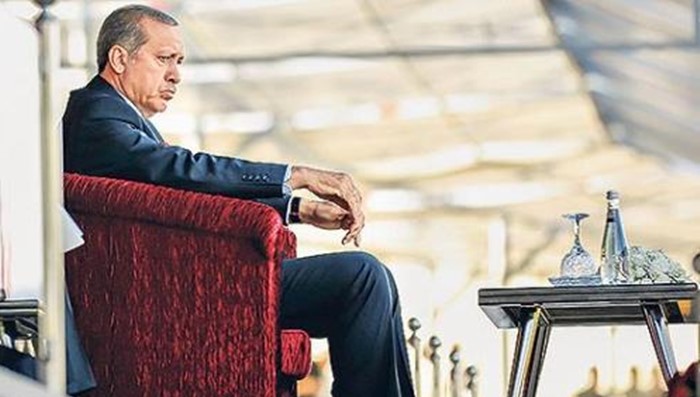Turkey’s president isn’t speaking for Muslims. He just wants to distract from his own failure.
Almost three decades after the late Samuel Huntington hypothesized a coming “clash of civilizations,” there are those who — for their own cynical purposes — would actually welcome exactly that. Among them is Turkish President Recep Tayyip Erdogan.
This month, he has once again picked a fight with Europe, and specifically France. The country is constitutionally Islamophobic, he claims. President Emmanuel Macron should get a mental-health checkup, he has said repeatedly. And Muslims everywhere should boycott French goods, Erdogan has urged, pretending to speak on behalf of an entire faith.
But Erdogan is picking this fight, like so many other unnecessary conflicts, only to distract Turks from his failure to govern, so that he can keep posing as the restorer of Turkish greatness, defined in opposition to the West. Neither Muslims nor Europeans of other faiths should fall for the provocation. It would be like stooping to the taunts of a bully in a sandbox — pointless, unedifying, and yet dangerous.
To recap: In a suburb of Paris this month, a teenager born in Chechnya beheaded Samuel Paty, a schoolteacher. Paty had shown his students caricatures of the Prophet Mohammed in a civics lesson on free speech, which included a discussion of the terrorist attack five years ago on the satirical magazine Charlie Hebdo. In an apparent copycat crime this week, a Tunisian in Nice decapitated a woman and killed two other people.More fromWhat Are the Odds of a Disputed Election? Pretty HighThe White House Surrenders to the PandemicThe Power of Wind and Women in WyomingSpray-Painting Through the Pandemic
In response, Macron has been cracking down on some of the extremist breeding grounds that produce such terrorists. Erdogan seized on this reaction to pretend that Macron, France and implicitly all Europe are enemies of Islam, like latter-day Crusaders.
Let’s separate the strands of action and reaction. The decapitations and other murders are barbaric crimes in France just as they would be in Turkey or any other country. They must be prosecuted accordingly. Furthermore, Macron or any other leader is justified in clamping down on the extremism that motivates such atrocities, just as governments must pursue any variety of terrorism.
Macron was also right to defend freedom of speech, which in his proudly secular country includes, as he put it, the “right to blaspheme.” But he then arguably overshot, as is his wont. It wasn’t for him to assert that Islam is “in crisis all over the world today.”
And yet I must disagree with my colleague Pankaj Mishra, who assigns more blame to Macron than to Erdogan for the current escalation. The worst that can be said about Macron is that he’s tone deaf. By contrast, Erdogan is cynical in a more malevolent way.
There was a time when Erdogan didn’t see the West as Turkey’s enemy and even wanted to join the European Union. But, feeling spurned by Brussels, Berlin, Paris and other Western capitals, he has turned populist, irredentist and belligerent. He used a failed coup attempt at home as his pretext to stamp out civil liberties including the freedom of speech for which France now stands. And he’s mismanaged Turkey’s economy.
To distract Turks from these failures, he tries to claim the mantle of former Ottoman and Islamic grandeur. So he rejects the secular legacy of Mustafa Kemal Ataturk (“father of the Turks”). That’s why, for example, Erdogan has turned Istanbul’s Hagia Sophia into a mosque. Built by the Byzantine emperor Justinian I in the sixth century, it was for centuries the largest church in Christianity, until the Ottoman sultan Mehmed II in 1453 converted it into a mosque. In 1934, Ataturk turned it into a museum. By making it a mosque again, Erdogan signals that he’s a new sultan.
In his mind, Erdogan wants Turkey to replace Saudi Arabia and Egypt as the guardian power of Sunni Islam, as the Ottoman Empire once was. And he wants to project power in all directions, toward Moscow as to the West. This is why he’s meddling in conflicts around the region, from Syria to Libya and the eastern Mediterranean, and now also in the battles between (ethnically Turkic) Azerbaijanis and Armenians. In several of these conflicts he faces France on the opposing side.
Nominally, Turkey is a member of NATO and still officially interested in applying to join the EU. In reality, Erdogan needs to portray Europe as the enemy. Because he’s weak at home, he’ll seize on any propaganda opportunity he gets. The danger is that in the process he might unleash passions and hatreds far beyond his, or anybody’s, control, potentially causing more violence, suffering and perhaps war. Europeans and Turks of any faith should see through Erdogan’s vanity and cynicism — and tactically ignore him.
This column does not necessarily reflect the opinion of the editorial board or Bloomberg LP and its owners.
Andreas Kluth is a columnist for Bloomberg Opinion. He was previously editor in chief of Handelsblatt Global and a writer for the Economist. He’s the author of “Hannibal and Me.



